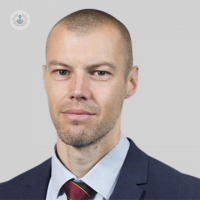Insights into arthroplasty
Written in association with:In his latest online article, Mr Tom Symes gives us his insights into arthroplasty. He talks about what it is, when and why its needed, how long it takes, side effects or risks and recovery.

What is an arthroplasty?
An arthroplasty refers to the surgical procedure of replacing a damaged or diseased joint with a prosthetic implant. I specialise in performing both hip and knee replacements. Hip replacements commonly involve complete joint replacements, particularly for cases of arthritis. In situations where the hip is fractured, a partial replacement, known as hemiarthroplasty, might be opted for.
When addressing knee arthritis, a partial knee replacement might be considered, wherein only a specific section of the knee joint is substituted with an artificial component. This procedure is less invasive, leading to a swifter recovery process and potentially yielding superior outcomes compared to a total knee replacement.
When and why is it needed?
Joint replacement surgery becomes a primary consideration when arthritis reaches a point where conventional methods of treatment fail to effectively manage the associated symptoms and discomfort.
How long does an arthroplasty take?
An arthroplasty surgery usually takes around one hour to perform in the operating room, and an additional half-hour is allocated before the surgery for administering anaesthesia and making the patient ready for the procedure.
Are there are any side effects or risks?
There are considerations regarding potential side effects and risks related to arthroplasty procedures. These can be broadly categorised into surgical and medical complications, encompassing a range of possible issues that individuals may encounter during or after the surgery. It's crucial for patients to be informed about these possibilities to make well-informed decisions about their treatment.
Is any recovery time needed?
Typically, patients undergo a recovery period that involves staying at the hospital for a single night immediately after the surgery. In the initial stages of recuperation, individuals often rely on walking aids such as sticks for a period of approximately 4 to 6 weeks. The ability to resume driving usually becomes feasible after about 6 weeks post-surgery. Regarding work commitments, patients might need to take a leave of absence for a span of 2 to 3 months to allow for proper healing and rehabilitation.
Mr Tom Symes is a distinguished orthopaedic surgeon with over 20 years of experience. You can schedule an appointment with Mr Symes on his Top Doctors profile.


